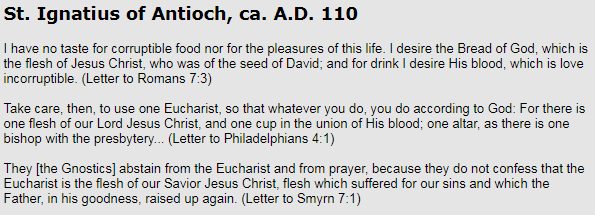The original liturgy:

The Roman liturgy:

Ignatius

Ignatius is either a flaming heretic, or he understands the elements metaphorically.
First, Ignatius calls it the “Bread of God”, not the “Bread of Christ”, which either makes him deny the canonical Trinity doctrine or else he is using “bread” in a broader metaphor than Roman Catholics use it. Either way, the canonical Roman liturgy appears absent.
Second, he calls the blood “love incorruptible”, which if literal is a heresy and if figurative means Ignatius thought the Christ’s blood was a metaphor. So the second quotation does not seem of much concern either.
Third, the quote from the Letter to the Philadelphians is extremely vague and ambiguous. It doesn’t challenge either viewpoint.
Fourth, we need to talk about the gnostics. Let’s look at a larger quote:
Citation: Ignatius of Antioch. “Epistle to the Smyrnaeans.” ¶6-7 (c.110AD)
Notice the part that FishEaters left out in her cherry-picked quotation. It is really important. Can you see it?
The Gnostic heretics failed to care for the widow, orphan, oppressed, slave, free, hungry, and thirsty, because they (1) did not participate in (2) offering (or sacrifice) of thanksgiving and prayer. They did not participate because they didn’t “confess the eucharist to be the flesh of Jesus.” What does this mean?
To confess the thanksgiving [eucharist] was the act of (4) consecrating the portion of the tithe offering used in the Lord’s Supper by saying the words of institution, just as Jesus consecrated the bread and wine after he had given it to his disciples and they had partaken of it. The church first (1-3) offered the thanksgiving [eucharist] as a tithe. Then they (4-5) celebrated the thanksgiving as a supper of consecrated bread and wine taken from the tithe. The thanksgiving [eucharist]—of unconsecrated tithes—was offered and the supper—of consecrated bread and wine—was eaten, not offered.
But, the Gnostics showed no regard for the needy by refusing to offer their tithes, because they denied the death and resurrection of Christ, because they denied Christ’s incarnation in the flesh.[1] Put simply, no Gnostic could say “This is my body; This is my blood” while denying that Jesus ever had a body or blood in the first place. The Gnostics could not (4) confess/consecrate (1-3) the tithe offering because it required them to acknowledge Christ’s body, and so did not (2) offer any tithe at all. For this reason, it was irrelevant that the consecrated bread was a metaphor or symbol. It simply wasn’t the issue being discussed.
As with the dismissal of the unbelievers and the unrepentant believers in the Didache’s liturgy, the Gnostics did not (and, indeed, could not) participate in the (1-3) offering of the tithe or the (4-5) celebration of the Lord’s Supper. That is why Ignatius says “they have no regard for love; no care for the widow, or the orphan, or the oppressed; of the bond, or of the free; of the hungry, or of the thirsty” immediately preceding “They abstain from the Eucharist.” These two are intrinsically linked: they are two ways of saying the same thing.
FishEaters had to leave that single sentence out because its inclusion shows that the Roman liturgy was not present in the early church. The original eucharist (thanksgiving) was the tithe: the thanksgiving offering. The Roman Catholic has to come up with a contrived explanation for why Ignatius is talking about helping the poor in the context of the Eucharist. The Protestant need only say “these are the same thing”: the eucharist is helping the poor.

Footnotes
[1] From “The Epistle of Ignatius to the Smyrnaeans:”
“…not, as certain unbelievers maintain, that He only seemed to suffer…”
“…but blasphemes my Lord, not confessing that He was [truly] possessed of a body?”

Pingback: Sacraments, Part 1: Divisions